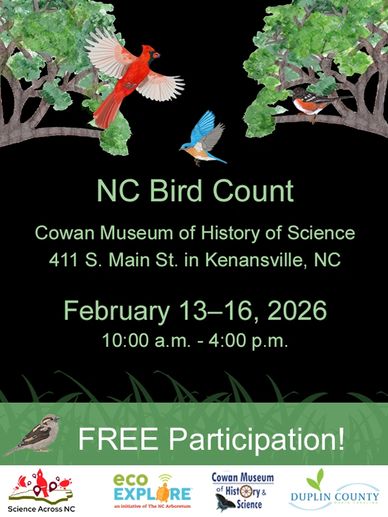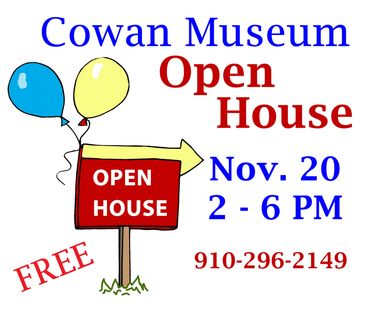What's Happening?
NC Bird Count
Stories from ANNE'S COLLECTIONS
Stories from ANNE'S COLLECTIONS

NC Bird Count
February 13–16, 2026 | 10:00 a.m. - 4:00 p.m.
The Cowan Museum of History of Science will participate in the North Carolina Bird Count, part of the Great Backyard Bird Count, by offering a self-guided opportunity for visitors to observe and count birds on museum grounds.
Participants may bird anywhere on the museum grounds for at least 15 minutes and submit their observations using the free eBird app or website. Basic bird identification resources and information about using the eBird and Merlin Bird ID apps will be available inside the museum on Friday and Saturday during open hours.
On Sunday and Monday, when the museum is closed, visitors may still independently count birds on the grounds.
Participants who complete at least three 15-minute checklists during the Bird Count weekend may qualify to earn a North Carolina Bird Count badge or sticker through Science Across NC.
This program aligns with ecoEXPLORE’s Ornithology Season and supports community science participation. Free. No registration is required. All ages welcome.
For more information, please call
Battista Bennett, STEM Educator, at
(910) 296-2149 or email her at battista.bennett@duplinnc.gov
Stories from ANNE'S COLLECTIONS
Stories from ANNE'S COLLECTIONS
Stories from ANNE'S COLLECTIONS

Stories from ANNE'S COLLECTIONS
Wednesday, February 18, 2026
Begins at 11 AM
*Limited Space
Registration ends on February 11, 2026. Please call Battista Bennett at
(910) 296-2149 or email at battista.bennett@duplinnc.gov
Retired Museum STEM Educator Anne Skinner, returns to discuss her items on display in the Cowan Museum's Rock Room Gallery. Selections from Skinner's vast collection that are on exhibit include specimens which are donated and on loan, such as a Triceratops frill fossil, a "volcanic bomb" found in Arizona, and several coiled, iridescent Ammonoid fossils!
ecoBLAST: Green & Wild
Stories from ANNE'S COLLECTIONS

The North Carolina Science Festival and the Cowan Museum present:
ecoBLAST: Green & Wild
Saturday, April 11, 2026
10 AM - 2 PM
Join us at the Cowan Museum for our annual ecoBLAST, as part of the North Carolina Science Festival. This year, we'll celebrate our green (plants) and wild (animals) friends who live in North Carolina. Plus, we'll focus on the environment and conservation.
There will be fun educational activities, live animals, a plant sale, prizes, food, and ice cream!
This event is free to the public and welcomes people of all ages.
For information about the NC Science Festival, please click here:
Museum Open House

Museum Open House
Thursday, November 20, 2025
2 PM - 6 PM
The museum will host a free, floating, public open house for the community to visit and to see the renovated upstairs gallery and meet some of our new staff.
Light refreshments will be served in the General Store.
Halloween at the Museum

Haunted Museum and Trick-or-Treat
Friday, October 31, 2025
6 PM - 8 PM
The museum will be open after-hours for trick-or-treaters and others who would like to see the historical park buildings and the Kelly-Farrior House at their scariest.
Candy will be handed out to our Halloween guests.
Moth Night

Moth Night at the Cowan Museum
Saturday, July 19, 2025
8:30 PM - 11:00 PM
*RAIN DATE: SAT., JULY 26, 2025, SAME TIME
The 2025 NC Moth Week is part of National Moth Week and will take place Saturday, July 19 through Sunday, July 27.
At the Cowan Museum, we will hold a special FREE Moth Night event in the botanical garden and grounds. The event will include:
- Identification stations in the historical park with fun facts.
- Museum staff will provide information on and assistance with ecoEXPLORE and iNaturalist.
- Painted "moth bait" trees in the garden with recipe handouts.
- Free stickers and prizes!
- Snacks and insect decorations in the general store.
- A movie in the one-room schoolhouse (Nocturnes, 2024, 1 hr, 22 min.)
- Moth Disco.
- Moth finger puppet-making activity.
Event Details
For more information about Moth Week, please check out: MOTHS .
Past Event: ecoBLAST: Climate Extravaganza

Saturday, March 22, 2025
11 AM - 2 PM
Informational displays, demos, hands-on activities, and games related to climate change and climate resilience will be aimed at all ages.
Presenters:
*WNCT 9 Weather
* Cape Fear Botanical Garden
*Core Sound Waterfowl Museum
* Duplin County Beekeepers Association
* Karen Beasley Sea Turtle Rescue
and Rehabilitation Center
*North Carolina Estuarium
*Sturgeon City Environmental Education Center
*North Carolina Museum of Natural Sciences - Whiteville
*James Sprunt Community College
Plus:
*Food & Drinks from:
Master Blend Family Farms
- and -
Sippin’ Sunshine
*Games and activities for
kids and adults
*Prizes
*Plants for sale by Nahunga Creek Tropicals
Currently in the "Rock Room"

A Journey Through Deep Time:
Dinosaur Bones, Rocks, and Fossils
In our renovated "Rock Room" gallery, see some of the fossils in the museum's collection and loaned specimens, such as an Allosaurus bone, Triceratops frill, and an American mastodon tusk.
Past Exhibit

Choosing to Participate
October 4, 2024 - January 10, 2025
Choosing to Participate is a poster exhibit developed by Facing History and Ourselves and the Smithsonian Institution Traveling Exhibition Service (SITES). The exhibit is sponsored by Duke Energy.
Included in the exhibit:
- A slide show with photographs of people and events in Duplin County, including Kenansville's outdoor dramas.
- Material on display from Duplin County Home Demonstration Clubs and the Stanford School.
- A voting booth provided by the Duplin County Board of Elections for you to cast your vote on what you’d like from the Museum.
- Artifacts donated by community members on display for the first time.
- Vinyl recordings of some of the most influential speeches in history.
We have an Apiary on the Museum Grounds
We are Part of the North Carolina Science Trail

The Duplin County Beekeepers Association has put up an apiary with two beehives located near our tobacco barn. The hives are not close to the main outbuildings and botanical garden.
However, the bees are certainly busy with all the flowers we have on the grounds, so please be aware of their presence and that they are doing important work as pollinators.
We are Part of the North Carolina Science Trail
We are Part of the North Carolina Science Trail
We are Part of the North Carolina Science Trail

The North Carolina Science Trail (NCST) is a STEM collection of about 60 partners across the state of North Carolina. The mission of the NC Science Trail is to inspire exploration of NC’s varied science landscape all year long. NCST aims to build awareness of science processes, cultivate appreciation for the role of science in our everyday lives, and encourage care for the natural world.
ecoEXPLORE
We are Part of the North Carolina Science Trail
We are Part of the North Carolina Science Trail
The Joann Cowan Brown Botanical Garden is a HotSpot in the ecoEXPLORE program!
ecoEXPLORE (Experiences Promoting Learning Outdoors for Research and Education) is an incentive-based citizen science program for children in grades K-8. Developed by The North Carolina Arboretum, this innovative program combines science exploration with kid-friendly technology to foster a fun learning environment for children while encouraging them to explore the outdoors and participate in citizen science.
It's Ornithology Season!
(January 2 - March 1)
Ornithology is the
study of birds.
Fun Fact:
Birds’ sizes can vary greatly. The California condor has a wingspan of 9.5 feet while the bee hummingbird measures less than 3”.
Source: https://www.ecoexplore.net/